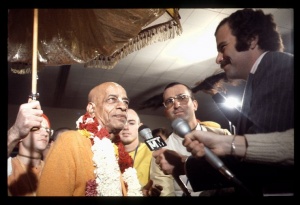SB 8.17.2-3: Difference between revisions
m (1 revision(s)) |
No edit summary |
||
| Line 1: | Line 1: | ||
{{info | {{info | ||
|speaker= | |speaker=Śukadeva Gosvāmī | ||
|listener=King | |listener=King Parīkṣit | ||
}} | }} | ||
[[Category:Srimad-Bhagavatam - Canto 08 Chapter 17|s02-03 ]] | |||
[[Category:Bhagavatam Verses Spoken by Sukadeva Gosvami - Vanisource|081702]] | |||
<div style="float:left">'''[[Srimad-Bhagavatam]] - [[SB 8|Eighth Canto]] - [[SB 8.17: The Supreme Lord Agrees to Become Aditi's Son|Chapter 17: The Supreme Lord Agrees to Become Aditi's Son]]'''</div> | |||
<div style="float:right">[[File:Go-previous.png|link=SB 8.17.1]] '''[[SB 8.17.1]] - [[SB 8.17.4]]''' [[File:Go-next.png|link=SB 8.17.4]]</div> | |||
{{RandomImage}} | |||
==== TEXTS 2-3 ==== | ==== TEXTS 2-3 ==== | ||
<div | <div class="verse"> | ||
cintayanty ekayā buddhyā | :cintayanty ekayā buddhyā | ||
mahā-puruṣam īśvaram | :mahā-puruṣam īśvaram | ||
pragṛhyendriya-duṣṭāśvān | :pragṛhyendriya-duṣṭāśvān | ||
manasā buddhi-sārathiḥ | :manasā buddhi-sārathiḥ | ||
manaś caikāgrayā buddhyā | |||
bhagavaty akhilātmani | :manaś caikāgrayā buddhyā | ||
vāsudeve samādhāya | :bhagavaty akhilātmani | ||
cacāra ha payo-vratam | :vāsudeve samādhāya | ||
:cacāra ha payo-vratam | |||
</div> | </div> | ||
| Line 21: | Line 27: | ||
==== SYNONYMS ==== | ==== SYNONYMS ==== | ||
<div | <div class="synonyms"> | ||
''cintayanti''—constantly thinking; ''ekayā''—with one attention; ''buddhyā''—and intelligence; ''mahā-puruṣam''—upon the Supreme Personality of Godhead; ''īśvaram''—the supreme controller, Lord Viṣṇu; ''pragṛhya''—completely controlling; ''indriya''—the senses; ''duṣṭa''—formidable, powerful; ''aśvān''—horses; ''manasā''—by the mind; ''buddhi-sārathiḥ''—with the help of intelligence, the chariot driver; ''manaḥ''—the mind; ''ca''—also; ''eka-agrayā''—with full attention; ''buddhyā''—with the intelligence; ''bhagavati''—unto the Supreme Personality of Godhead; ''akhila-ātmani''—the Supreme Soul, the Supersoul of all living entities; ''vāsudeve''—unto Lord Vāsudeva; ''samādhāya''—keeping full attention; ''cacāra''—executed; ''ha''—thus; ''payaḥ-vratam''—the ritualistic ceremony known as ''payo-vrata''. | |||
</div> | </div> | ||
| Line 28: | Line 34: | ||
==== TRANSLATION ==== | ==== TRANSLATION ==== | ||
<div | <div class="translation"> | ||
With full, undiverted attention, Aditi thought of the Supreme Personality of Godhead and in this way brought under full control her mind and senses, which resembled forceful horses. She concentrated her mind upon the Supreme Lord, Vāsudeva. Thus she performed the ritualistic ceremony known as payo-vrata. | With full, undiverted attention, Aditi thought of the Supreme Personality of Godhead and in this way brought under full control her mind and senses, which resembled forceful horses. She concentrated her mind upon the Supreme Lord, Vāsudeva. Thus she performed the ritualistic ceremony known as payo-vrata. | ||
</div> | </div> | ||
| Line 35: | Line 41: | ||
==== PURPORT ==== | ==== PURPORT ==== | ||
<div | <div class="purport"> | ||
This is the process of ''bhakti-yoga''. | |||
:''anyābhilāṣitā-śūnyaṁ'' | |||
:''jñāna-karmādy-anāvṛtam'' | |||
:''ānukūlyena kṛṣṇānu-'' | |||
:''śīlanaṁ bhaktir uttamā'' | |||
:([[CC Madhya 19.167]]) | |||
"One should render transcendental loving service to the Supreme Lord Kṛṣṇa favorably and without desire for material profit or gain through fruitive activities or philosophical speculation. That is called pure devotional service." One simply has to concentrate upon the lotus feet of Vāsudeva, Kṛṣṇa (''sa vai manaḥ kṛṣṇa-padāravindayoḥ'', [[SB 9.4.18-20|SB 9.4.18]]). Then the mind and senses will be controlled, and one can engage himself fully in the devotional service of the Lord. The devotee does not need to practice the ''haṭha-yoga'' system to control the mind and senses; his mind and senses are automatically controlled because of unalloyed devotional service to the Lord. | |||
</div> | |||
" | |||
</div> | <div style="float:right; clear:both;">[[File:Go-previous.png|link=SB 8.17.1]] '''[[SB 8.17.1]] - [[SB 8.17.4]]''' [[File:Go-next.png|link=SB 8.17.4]]</div> | ||
__NOTOC__ | __NOTOC__ | ||
__NOEDITSECTION__ | |||
Revision as of 09:31, 4 July 2021

A.C. Bhaktivedanta Swami Prabhupada
TEXTS 2-3
- cintayanty ekayā buddhyā
- mahā-puruṣam īśvaram
- pragṛhyendriya-duṣṭāśvān
- manasā buddhi-sārathiḥ
- manaś caikāgrayā buddhyā
- bhagavaty akhilātmani
- vāsudeve samādhāya
- cacāra ha payo-vratam
SYNONYMS
cintayanti—constantly thinking; ekayā—with one attention; buddhyā—and intelligence; mahā-puruṣam—upon the Supreme Personality of Godhead; īśvaram—the supreme controller, Lord Viṣṇu; pragṛhya—completely controlling; indriya—the senses; duṣṭa—formidable, powerful; aśvān—horses; manasā—by the mind; buddhi-sārathiḥ—with the help of intelligence, the chariot driver; manaḥ—the mind; ca—also; eka-agrayā—with full attention; buddhyā—with the intelligence; bhagavati—unto the Supreme Personality of Godhead; akhila-ātmani—the Supreme Soul, the Supersoul of all living entities; vāsudeve—unto Lord Vāsudeva; samādhāya—keeping full attention; cacāra—executed; ha—thus; payaḥ-vratam—the ritualistic ceremony known as payo-vrata.
TRANSLATION
With full, undiverted attention, Aditi thought of the Supreme Personality of Godhead and in this way brought under full control her mind and senses, which resembled forceful horses. She concentrated her mind upon the Supreme Lord, Vāsudeva. Thus she performed the ritualistic ceremony known as payo-vrata.
PURPORT
This is the process of bhakti-yoga.
- anyābhilāṣitā-śūnyaṁ
- jñāna-karmādy-anāvṛtam
- ānukūlyena kṛṣṇānu-
- śīlanaṁ bhaktir uttamā
- (CC Madhya 19.167)
"One should render transcendental loving service to the Supreme Lord Kṛṣṇa favorably and without desire for material profit or gain through fruitive activities or philosophical speculation. That is called pure devotional service." One simply has to concentrate upon the lotus feet of Vāsudeva, Kṛṣṇa (sa vai manaḥ kṛṣṇa-padāravindayoḥ, SB 9.4.18). Then the mind and senses will be controlled, and one can engage himself fully in the devotional service of the Lord. The devotee does not need to practice the haṭha-yoga system to control the mind and senses; his mind and senses are automatically controlled because of unalloyed devotional service to the Lord.